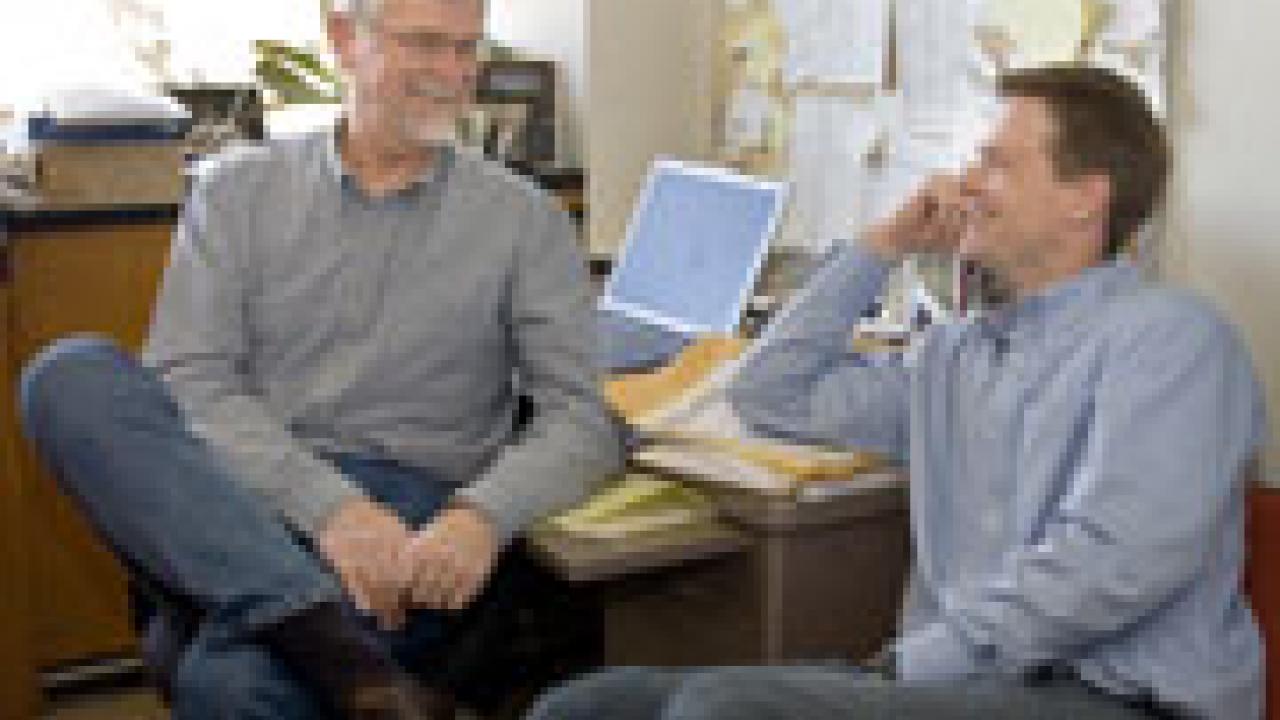Meet Professor Ted DeJong. Meet Assistant Professor Jason DeJong. They are father and son, believed to be the only such professor pair at UC Davis.
Ted, a campus veteran, is a teacher and researcher in pomology — "basically, fruit and nut crop physiology and management," he explained. Jason is new to the Department of Civil and Environmental Engineering.
But while their disciplines are different, they share the same dedication and enthusiasm for their work.
"There are not many jobs like this in the world," the 32-year-old Jason said. "Part of our charge is to contribute to society and teach, and aside from that we have a lot of latitude in what we research."
His father added: "It's hard work, but I don't know of another job where the individual has so much freedom to actually choose the specialty research they are going to do."
For Ted, 59, that freedom allows him to work on projects like his peach tree model: It sprouts on his laptop's screen and grows through the years as the computer runs calculations for every branch, leaf and piece of fruit.
Jason joined his dad in many an orchard while growing up, and is no stranger to getting his hands dirty — like when he laid irrigation pipe.
Today he gets his hands dirty in his lab, where he does research on soil. Not for growing crops. He works with soil as the foundation material for many infrastructure systems, and within the context of tunnels, retaining walls, dams and embankments.
"I like building things, that was part of it," he said, explaining what led him into engineering. "But I needed the outdoor part of it."
He gets plenty of outdoor time when visiting building sites to investigate the soil. In his lab, he is researching how microorganisms can "cement" soil, to prevent liquefaction in earthquakes or to strengthen levees.
He enjoys working with natural materials, he said, because of their unknown natural variables. "There is a little more art involved than there is in cookbook engineering," he said, referring to engineers who, in part, work with man-made materials that are more predictable.
His brother Matt, a structural engineer, might not like the "cookbook" assessment. He is studying for his doctorate at the Massachusetts Institute of Technology.
Together, with Jason working on the foundation and Matt on the structure, they could put up a building.
"But you couldn't eat it," said their dad, quick to point out the value of his own speciality: fruit trees.
Ted DeJong received his undergraduate degree from Calvin College in Grand Rapids, Mich., and was a graduate student in botany at Davis from 1974 to 1977. The next year he did post-doctoral work at the Smithsonian Institution. He returned to Davis in 1979 as a post-doctoral student in agronomy and range science. He has been here ever since.
He served as chair of the Department of Pomology for eight years. Pomology is now part of the Department of Plant Sciences, and Ted is a vice chair. He has served on upper level Academic Senate committees for seven years, and is finishing a two-year term as the senate's vice chair.
As a graduate student at Davis, Ted and his wife, Rose, lived in the Solano Park married student housing — where they moved in with their infant son Jason in 1974.
Eventually the DeJongs moved to a home three blocks from campus, where the DeJong children — Jason, Mike and Matt — grew up. Of course they spent quite a bit of time in their dad's office. Jason recalled summer jobs cleaning the office or organizing his dad's files.
"UC Davis was part of everything in our lives," Jason said. He graduated from UC Davis in 1996, and his two younger brothers are alumni, too. So are all three of their wives.
While pursuing his master's degree, Jason said, he decided to enter academia as a career. He received his master's and doctoral degrees from the Georgia Institute of Technology.
He was a post-doctoral research fellow at the University of Western Australia in 2001. The next year he joined the University of Massachusetts Amherst faculty as an assistant professor, and stayed there until coming to Davis last fall.
Jason said he was "somewhat hesitant to apply" for a faculty post at Davis, recognizing the difficulty in getting a university job anywhere, "let alone back in the place you grew up." He made certain not to get his hopes up.
Now, with a family of his own — wife Julie and two small children — Jason has the same challenges that his dad and all academics face: advancing his professional work and making time for his family, too. He noted with pride how his father hardly ever missed being home for dinner with the family, and always attended his sons' academic and athletic events.
Said Ted: "It's hard to balance all the demands, but the fact that no one is standing over you daily is definitely a benefit of the job."
Like father, like son.
--30--
Media Resources
Clifton B. Parker, Dateline, (530) 752-1932, cparker@ucdavis.edu
